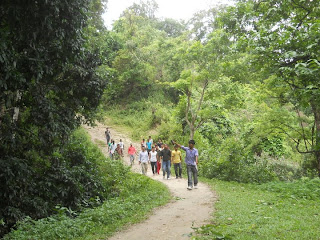1. Over two-thirds of air pollution in US cities is from auto emissions. The good news is car rental companies are experimenting with eco-friendly vehicles in some US cities. In the meantime, bus and train travel cut both pollution and the number of vehicles on the road. Rent a bike, use local transit or stay within walking distance of your targeted tourist sites. Use the airport shuttle or share a cab. If you're parked or stuck in traffic, turn off the engine.
2. Fly Southwest or Virgin Airlines - the industry leaders for eco-friendly travel. Southwest has adopted a policy of recycling all cabin waste and uses electronic ticketing throughout their system, reducing paper waste. Virgin Airlines has made mega-donations to developing 'green' solutions for air travel, and is a leader in implementing a system of towing planes to a take-off grid, resulting in less fuel consumption, less noise, and reduced CO2 emissions. Other airlines are working to adopt 'green' policies. You can reduce carbon emissions by choosing a closer destination or finding alternative transportation. If your schedule permits, travel by train or bus to your destination. Also consider making a donation to an organization that provides 'carbon offsets' toward your CO2 travel usage, basically a donation to help develop 'green' resources such as solar power or reforestation.
 3. Take advantage of 'green' hotel policies by reusing your sheets and towels if you are staying more than one night. The savings in energy and water costs and detergent usage are significant. It's been estimated that at least 70% of guests take advantage of this simple idea. Use your own shampoo and soap instead of the mini-bottles and bars provided in most hotels.
3. Take advantage of 'green' hotel policies by reusing your sheets and towels if you are staying more than one night. The savings in energy and water costs and detergent usage are significant. It's been estimated that at least 70% of guests take advantage of this simple idea. Use your own shampoo and soap instead of the mini-bottles and bars provided in most hotels.
4. Take shorter showers (Remember - in some areas, water is a limited resource. Your luxurious long shower could be depriving a native family of precious water.) Turn off the TV and lights if you're not in the room, and monitor your heat and A/C usage. Turn the thermostat off if you're going to be gone for an extended period during the day. Use a refillable water bottle and recycle wherever possible.
5. Pick an eco-friendly destination, also known as sustainable tourism. Enjoy local markets, native sites, and a natural environment. 'Leave it better than you found it', or at least strive to have a neutral impact on the area. Visit parks and local nature areas so your dollars can support the eco-economy. Orbitz (eco.orbitz.com/) has developed a list of 'green' destinations in the US, Canada, Mexico and the Caribbean to meet the growing demand for eco-friendly travel.
6. If you're idea of a great day-away is aboard a boat, be aware of your fueling practices. Leakage at the nozzle, overflowing the fuel tank, leaky hoses or maintenance issues all contribute to stress of the water environment. Keep absorbent pads aboard to mop up possible spills and dispose of the material properly. Do not use soap to clean up a fuel spill. Use propylene glycol to winterize water lines, not common car anti-freeze which is highly poisonous to animals. And if your yacht has on-board facilities, dispose of sewage and wastewater properly.
7. Before you leave home, stop your newspaper delivery; pull the plugs on appliances (TV, VCR/DVD player, toaster, coffee maker, microwave, etc.) to prevent energy drain. Turn down your thermostat and hot water tank, and turn off the A/C.
 8. Find solar-powered radios, cell-phone chargers, calculators and other 'powered' items to pack. This market is growing, and solar power has no impact on the environment. It's a true eco-friendly sustainable resource. Use a digital rather than a film camera.
8. Find solar-powered radios, cell-phone chargers, calculators and other 'powered' items to pack. This market is growing, and solar power has no impact on the environment. It's a true eco-friendly sustainable resource. Use a digital rather than a film camera.
9. Buy eco-friendly souvenirs. Don't purchase items that could possibly be made from endangered species. Support the local economy so that your tourist dollars benefit the natives' endeavors.
10. When you get home, write to your hotel and other travel providers to let them know you appreciate their 'green' initiatives. Your dollars speak loudly in the tourism industry and will influence travel and tourism in the areas you visit. Plan carefully to support travel companies, destination purveyors and suppliers who support your 'green' initiative.
The world is a wonderful place, and we can all do more to support 'green' initiatives. Adapt these suggestions at home as well as on the road so travelers to your hometown will also experience an eco-friendly vacation.






